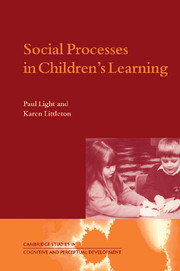Book contents
- Frontmatter
- Contents
- List of figures
- Preface
- Acknowledgements
- 1 Peer interaction and learning: perspectives and starting points
- 2 Peers and puzzles: a first series of studies
- 3 Computers and learning
- 4 Kings, Crowns and Honeybears: a second series of studies
- 5 Gender agendas
- 6 Social comparison and learning
- 7 Interaction and learning: rethinking the issues
- References
- Index
- Cambridge Studies in Cognitive and Perceptual Development
1 - Peer interaction and learning: perspectives and starting points
Published online by Cambridge University Press: 22 September 2009
- Frontmatter
- Contents
- List of figures
- Preface
- Acknowledgements
- 1 Peer interaction and learning: perspectives and starting points
- 2 Peers and puzzles: a first series of studies
- 3 Computers and learning
- 4 Kings, Crowns and Honeybears: a second series of studies
- 5 Gender agendas
- 6 Social comparison and learning
- 7 Interaction and learning: rethinking the issues
- References
- Index
- Cambridge Studies in Cognitive and Perceptual Development
Summary
Introduction
This chapter will set the scene for those that follow by going back to the 1970s to examine some of the strands of theory and empirical research which converged around the question of when and how peer interaction can facilitate children's understanding and learning. Starting with social learning theory, we shall develop a focus on the concept of socio-cognitive conflict as an engine of mental development, a concept that owes its origins to Piaget, via Doise and colleagues. The Piagetian origins of this idea are reflected in the selection of tasks in these early studies, and this in turn gives rise to certain problems in terms of the interpretation of some of the experimental findings. This consideration will take us on a slight detour in the course of this chapter, raising issues to be returned to later. The latter part of the chapter will be given over to an account of the series of experimental studies of peer facilitation of children's problem solving which marked our own initial engagement with this field of research.
Modelling success: the social learning theory approach
As inheritors of the behaviourist approach to learning, social learning theories exerted a strong influence upon the psychology of child development in the 1970s. Such theories saw modelling as a key formative process in cognitive as well as other aspects of development. Thus any facilitative effects of child–child interaction in learning were construed largely in terms of processes of imitation or modelling.
- Type
- Chapter
- Information
- Social Processes in Children's Learning , pp. 1 - 13Publisher: Cambridge University PressPrint publication year: 2000



